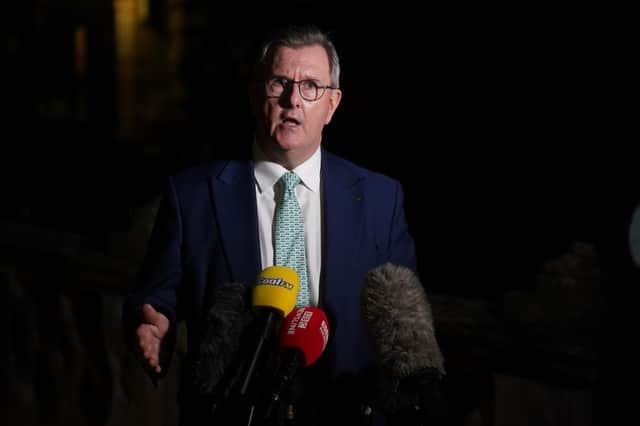Owen Polley: The DUP is being asked to change direction dramatically just as trade barriers harden


The party’s representatives and staff assured reporters repeatedly that this gathering was routine. But rumours persisted that Sir Jeffrey Donaldson would make an announcement afterwards about restoring power-sharing, or at least ‘take soundings’ from his members about whether they might accept a compromise on the Northern Ireland Protocol / Windsor Framework.
The word ‘white smoke’ was even uttered in some quarters.
As a result, the BBC’s late news programme, and its political flagship, The View, both featured coverage from the car-park outside the meeting. The corporation’s political editor, Enda McClafferty, conducted a live interview with Sir Jeffrey, after it concluded.
Advertisement
Hide AdAdvertisement
Hide AdIn some ways, the timing of this furore was odd, and, as expected, the DUP leader tried to quash the idea that he’d put new proposals to his party, or that its members were divided on how to tackle the framework.
“In terms of taking soundings, I talk to my party all the time,” he said. “I hold townhall meetings with people. I listen to what people have to say and their concerns. Indeed many of those who have concerns were at the heart of the proposals we put to government.”
This answer was presumably calculated to dismiss rumours, circulating on messaging platforms and social media last week, that Lord (Nigel) Dodds was excluded from drafting or even reading a paper that the DUP presented to ministers at Westminster.
Given this lack of drama, then, why did the media get excited?
Advertisement
Hide AdAdvertisement
Hide AdSometimes, a political story gains momentum, and creates such a sense of expectation, that it’s difficult to tell whether journalists are merely covering events or driving them. It wasn’t quite as simple as that last week.
Many commentators are predicting that the government will table its response to the DUP’s paper, or more likely present proposals of its own, some time this week. Whether or not this timetable is accurate, the national party conference season is coming to an end, and Westminster is gearing up for an election in 2024.
The theory, therefore, is that the government will make one more attempt to placate the DUP during the autumn, before forgetting about Northern Ireland and concentrating exclusively on trying to get re-elected. The argument you’ll increasingly hear is that this is the last chance to restore power-sharing and, if unionists miss this opportunity, Stormont will not return for the foreseeable future.
The difficulty is that, in almost every other respect, it is a deeply unpromising moment to try to bring back devolution.
Advertisement
Hide AdAdvertisement
Hide AdThe first elements of the Windsor Framework are now in place, hardening the Irish Sea border that was created by the NI Protocol. The misnamed ‘green lane’ is operating for food, goods are being labelled ‘not for EU’ and people are starting to find that, either they cannot get certain products by mail order, or they are being asked to buy them from Irish rather than British websites.
The more framework that is applied, and the more thoroughly the authorities implement it, the more completely the lies it was based on will unravel. The DUP is being asked to change direction dramatically just as trade barriers harden and the EU tightens its authority over Northern Ireland.
On the other hand, the government may offer to implement legislation that it says addresses unionist concerns about the sea border. And Sir Jeffrey, in his BBC interview, did not emphasise his party’s ‘seven tests’ for neutralising the protocol, but said instead that ministers needed to make the framework match the claims that they made for it.
He might argue that that is another way of saying the same thing, but he must also know that unionists will be wary of trusting the government’s promises.
Advertisement
Hide AdAdvertisement
Hide AdWe’ve been offered assurances before, through the New Decade, New Approach deal, the Internal Market Act, and other documents, that Northern Ireland’s place in the UK internal market would be respected. It didn’t prevent the government from enforcing a harder internal border, under the Windsor Framework, than we experienced up to now.
Indeed, the government tried previously to persuade the DUP to return to power-sharing through the Northern Ireland Protocol Bill, before allowing it to stall in the House of Lords and then scrapping it.
Even if Rishi Sunak were to offer effective legislation, how likely would it be to clear all the parliamentary hurdles and enter into law, before his administration is out of office?
None of these points mean that Sir Jeffrey doesn’t face a genuine dilemma about his party’s tactics. They are not intended either to dismiss the argument that the longer a boycott continues without a positive outcome, the more it erodes people’s confidence in Northern Ireland, and the more likely it is to undermine the Union rather than repair it.
Advertisement
Hide AdAdvertisement
Hide AdIf that is the DUP’s conclusion, though, it should explain it honestly and openly to its supporters and the rest of unionism. That may go against the instincts of its campaign team, but it would be more persuasive than claiming some kind of victory based on commitments from the government.
Voters aren’t naïve. They realise, from repeated experience, that any supposed breakthrough, whether it’s comforting legislation or an apparent workaround on implementation, will probably not deliver what it promises and, in any case, may never actually come into force.